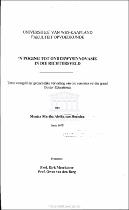'n Poging tot onderwysinnovasie in die Richtersveld
Abstract
This thesis represents the outcome of an interaction between a participating "outsider" and a group of teachers during which a continued dialogue between theory and practice was pursued. The goal was to enhance the quality of teaching practice in a specific situation on the one hand and on the other, gain deeper insight into the theoretical aspects which have a bearing on classroom practice. The research
project was initially started in response to teachers' request for help with the teaching of Afrikaans first language to learners whose home language was Afrikaans, but who did not make satisfactory progress in Teachers from four schools in the Richtersveld, a far-off region in the Northern Cape, one of the nine provinces of South Africa, joined the INSET project and participated in a hands-on language programme in
which a different approach from the traditional teaching and learning model was advocated. The innovative programme focused on an integrated approach to the teaching and learning of reading and writing as meaning-making activities. The research was carried out within a qualitative research framework in which participants not only had to carry out specific innovative learning tasks, but had to reflect on the value of their actions with a view to become change agents who would facilitate learning in such a manner that their pupils would also develop into reflective agents who would be able to take charge of their particular life world. The project experience was shared through a narrative which required of readers to take a stance since they had to make meaning of the identified themes and motifs which gradually emerged. Some of the major themes which, in my view, developed were: that successful communication between stakeholders in die
teaching and learning event is a prerequisite for successful learning. Language is a social construct, but is the central medium of communication, therefore, all participants should understand the operative "rules" of communication in a specific learning context. All pupils in multi-lingual classes should be in a position where their life chances, not only their life-styles, are enhanced. Teachers and pupils should be sensitised to the fact that they have to re-invent their own culture on a continuous basis in order to meet the demands set by the dynamic nature of present-day culture norms as they manifest in reality. Teachers in an innovative INSET programme such as the GGLESIP project should be willing to change their thinking about what learning entails. This presupposes a change of attitude and a changed concept of leadership which is different from mere classroom management. In this particular teaching and learning situation it has become clear that INSET, like all other teaching and learning activities is norm oriented.

